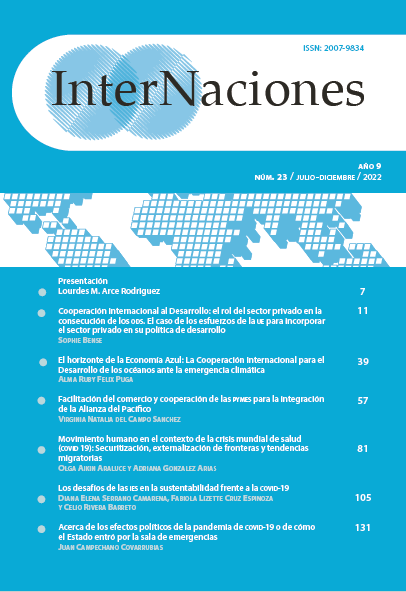Transformation and Crisis: The Mexican State from the 1982 Debt Crisis
DOI:
https://doi.org/10.32870/in.vi23.7223Keywords:
Debt Crisis, Mexican State, Competition State, Narration, NeoliberalismAbstract
The present article has as its main objective to analyze the transformation that the Mexican state suffered during the 1980 decade, derived from de 1982 debt crisis. Taking in consideration that in order to understand the present context is necessary to create an historic narrative that enable us to link this phenomenon with its genesis, which is denominated as the retreat of state or the transformation of the Welfare State, the article seeks to show the events that allowed this to happen and, then, to think about the present situation. In order to do this, we take in consideration two main theoretical approaches, the vision of the transformation of the State of Bob Jessop and Phillip G. Cerny and Colin Hay’s narrative construction of crisis in order to exhibit that the Mexican debt crisis, permit the creation of a dominant narrative of the crisis itself allowing the Mexican ruling class to promote a new path in the trajectory of the state.Downloads
References
• Amador Vázquez, S. (2014). Modalidad neoliberal del Estado y gobierno mexicano en sus procesos de acumulación de capital: ¿Más Estado o mercado? Tla-Melaua. Revista de Ciencias Sociales, 8(36). http://dx.doi.org/10.32399/rtla.8.36.61
• Ávila, J.L. (2006). Historia económica de México, vol. 6. La era neoliberal. Océano
• Beltrán, U. (1990). Las Dimensiones Estructurales de la Crisis de 1982. Foro Internacional, Volúmen XXX, 4(246), pp. 597-630
• Babb, S. (2003). Proyecto México. Los Economistas del Nacionalismo al Neoliberalismo. Fondo de Cultura Económica
• Babb, S. (2005). Del Nacionalismo al Neoliberalismo: El Ascenso de los Nuevos Money Doctors en México. En Mato, D. (Editor). Políticas de Economía, Ambiente y Sociedad en Tiempos de Globalización. Universidad Central de Venezuela, pp. 155-172
• Babb, S. (2015). From Nationalism to Neoliberalism: Conflict and Consensus in the History of Mexican Economics, En Montecinos, V., Markoff, J. (Eds). Economists in the Americas. Edward Elgar Publishing, pp. 227-252.
• Beltrán, U. (1990). Las dimensiones estructurales de la crisis de 1982. Foro Internacional, 30(4 (120)), 597–630. http://www.jstor.org/stable/27755738
• Birch, K., & Siemiatycki, M. (2016). Neoliberalism and the geographies of marketization: The entangling of state and markets. Progress in Human Geography, 40(2), 177–198. https://doi.org/10.1177/0309132515570512
• Blyth, M. (2002). Great Transformations: Economic Ideas and Institutional Change in the Twentieth Century. Cambridge: Cambridge University Press.
• Bortz, J. L., & Mendiola, S. (1991). El impacto social de la crisis económica de México. Revista Mexicana de Sociología, 53(1), 43–69. https://doi.org/10.2307/3540828
• Boettke, P.J., Leeson, P.T. (2003). Postwar Heterodox Economics. En: Samuels, W.J., Biddle, J.E., Davis, J.B. (Eds.). A Companion to the History of Economic Thought. Blackwell Publishing
• Camp, R.A. (2002). Mexico’s Mandarins: Crafting Power Elite for the Twenty-First Century. University of California Press
• Cárdenas Sánchez, E. (2015). El Largo Camino de la Economía Mexicana. De 1780 a Nuestros Días. Fondo de Cultura Económica
• Cerny, P. G. (1997). Paradoxes of the Competition State: The Dynamics of Political Globalization. Government and Opposition, 32(2), 251–274. http://www.jstor.org/stable/44484037
• Cerny, P.G. (2010) The competition state today: from raison d’État to raison du Monde, Policy Studies, 31:1, 5-21, DOI: 10.1080/01442870903052801
• Collado, María del Carmen. (2011). Autoritarismo en tiempos de crisis: Miguel de la Madrid 1982-1988. Historia y grafía, (37), 149-177. Recuperado en 26 de octubre de 2021, de http://www.scielo.org.mx/scielo.php?script=sci_arttext&pid=S1405-09272011000200006&lng=es&tlng=es
• Cornelius, W. A. (1985). The Political Economy of Mexico under De la Madrid: Austerity, Routinized Crisis, and Nascent Recovery. Mexican Studies/Estudios Mexicanos, 1(1), 83–124. https://doi.org/10.2307/1051981
• Copley, J., Moraitis, A. (2021) Beyond the Mutual Constitution of States and Markets: On the Governance of Alienation, New Political Economy, 26:3, 490-508. 10.1080/13563467.2020.1766430
• Cuadra-Montiel, H. (2007). Critical Realism and the Strategic-Relational Approach, Journal of Critical Realism, 6:1, 84-110, DOI: 10.1558/jocr.2007.v6i1.84
• Cuadra-Montiel, H. (2016), Power, State, and Market in Mexico: A Polanyian Critique. Latin American Policy, 7: 5-25. https://doi.org/10.1111/lamp.12088
• Escalante Gonzalbo, F. (2015). Historia Mínima del Neoliberalismo. El Colegio de México
• Frieden, J.A. (2007). Global Capitalism: It’s Fall and Rise in the Twentieth Century. W.W. Norton Company
• Guillen Romo, H. (2018). Los Orígenes del Neoliberalismo: Del Coloquio Lippmann a la Sociedad Mont Pelerin. EconomíaUnam, 5:43
• Gilly, A. (1986). México: Crisis y Modernización del Capitalismo. Nueva Sociedad, 82, 14-22
• Hay, C. (1999). Crisis and the Structural Transformation of the State: Interrogating the Process of Change. The British Journal of Politics and International Relations, 1(3), 317–344. https://doi.org/10.1111/1467-856X.00018
• Hay, C. (2004), Re-Stating Politics, Re-Politicising the State: Neo-liberalism, Economic Imperatives and the Rise of the Competition State. The Political Quarterly, 75: 38-50. https://doi.org/10.1111/j.1467-923X.2004.621_1.x
• Hay, C. (2016) Good in a crisis: the ontological institutionalism of social constructivism, New Political Economy, 21:6, 520-535, DOI: 10.1080/13563467.2016.1158800
• Harvey, D. (2005). A Brief History of Neoliberalism. Oxford University Press
• Helleiner, E. (1994). States and the Reemergence of Global Finance: From Bretton Woods to the 1990s. Cornell University Press
• Hernández Rodríguez, R. (2020). La persistencia de una idea: el nacionalismo revolucionario. Del PRI a López Obrador. Foro internacional, 60(2), 501-536. Epub 14 de agosto de 2020.https://doi.org/10.24201/fi.v60i2.2732
• Huerta Moreno, M. G. (2005). El neoliberalismo y la conformación del Estado subsidiario. Política y cultura, (24), 121-150. Retrieved October 26, 2021, from http://www.scielo.org.mx/scielo.php?script=sci_arttext&pid=S0188-77422005000200006&lng=en&tlng=es
• Jessop, Bob. (1993). Towards a Schumpeterian Workfare State? Preliminary Remarks on Post-Fordist Political Economy, Studies in Political Economy, 40:1, 7-39, 10.1080/19187033.1993.11675409
• Jessop, B. (2002). The Future of the Capitalist State. Polity
• Jessop, B. (2006). ¿Narrando el Futuro de la Economía Nacional y el Estado Nacional? Puntos a Considerar Acerca del Replanteo de la Regulación y la Re-Invención de la Gobernancia. Documentos Y Aportes En Administración Pública Y Gestion Estatal, 1(7), 7-44. https://doi.org/10.14409/da.v1i7.1205
• Jessop, Bob (2008). El Futuro del Estado Capitalista. Catarata
• Leal Martínez, A. (2016). Neoliberalismo, Estado y ciudadanía. La crisis del “pacto revolucionario” en torno al sismo de 1985. Relaciones Estudios de Historia y Sociedad, 37(147), 51-84. http://dx.doi.org/10.24901/rehs.v37i147.175
• Levy, J.D; Leibfried, S; Nullmeier, Frank (2015). Changing Perspectives on the State. En: Leibfried, S. et al. The Oxford Handbook of the Transformations of the State. Oxford University Press, pp. 33-60
• Link, S.J. (2020). Forging Global Fordism: Nazi Germany, Soviet Russia and the Contest over the Industrial Order. Princeton University Press
• Meyer, L. (1993). El presidencialismo. Del populismo al neoliberalismo. Revista Mexicana de Sociología, 55(2), 57–81. https://doi.org/10.2307/3541102
• Morton, A. D. (2003). Structural Change and Neoliberalism in Mexico: “Passive Revolution” in the Global Political Economy. Third World Quarterly, 24(4), 631–653. http://www.jstor.org/stable/3993429
• Morton, A.D. (2017). Revolución y Estado en el México Moderno. Siglo XXI.
• Orozco, J., Nuñez de la Peña, F.J. (1993). Ideología y programa de gobierno en los discursos de toma de posesión de los presidentes de México: 1928-1982. ITESO
• Plehwe, D. (2016). Neoliberal Hegemony. En Springer, S., Birch, K., MacLeavy, J.(Eds). The Handbook of Neoliberalism. Routhledge, pp.61-72
• Rodríguez Díaz, Erwin. (2011). Por la voluntad o por la fuerza: El escenario para la apertura democrática y la reforma política. Echeverría y López Portillo. Estudios políticos (México), (22), 81-106. Recuperado en 26 de octubre de 2021, de http://www.scielo.org.mx/scielo.php?script=sci_arttext&pid=S0185-16162011000100006&lng=es&tlng=es.
• Romero Sotelo, M.E. (2016). Los Orígenes del Neoliberalismo en México: La Escuela Austriaca. Fondo de Cultura Económica
• Romero Sotelo, M.A. (2013). The Origins of Economic Orthodoxy in Mexico. En Perrota, C., Sunna, C. (Eds.). Globalization and Economic Crisis. Università del Salento, pp. 119-164
• Ruggie, J. G. (1982). International Regimes, Transactions, and Change: Embedded Liberalism in the Postwar Economic Order. International Organization, 36(2), 379–415. http://www.jstor.org/stable/2706527
• Salazar, Francisco (2004). Globalización y Política Neoliberal en México. El Cotidiano, 20(126)
• Samman, A. (2015) Crisis theory and the historical imagination, Review of International Political Economy, 22:5, 966-995, DOI: 10.1080/09692290.2015.1011682
• Sheppard, R. (2011), Nationalism, economic crisis and ‘realistic revolution’ in 1980s Mexico. Nations and Nationalism, 17: 500-519. https://doi.org/10.1111/j.1469-8129.2010.00472.x
• Soedeberg, S. (2001). From a Developmental State to a Competition State? Conceptualising the Mexican Political Economy within Global Financial Orthodoxy. Competition & Change, 5: 2, 135-163. https://doi.org/10.1177/102452940100500202
• Soederberg, S. (2005). The Rise of Neoliberalism in Mexico: from a Developmental to Competition State. En Soederberg, S., Menz, G., Cerny, P.G. (Eds). Internalizing Globalisation. The Rise of Neoliberalism and the Decline of National Varieties of Capitalism. Palgrave. Pp. 167-182
• Sorensen, G. (2004). The Transformation of the State. Beyond the Myth of Retreat. Palgrave Macmillan
• Strange, S. (1996). The Retreat of the State. The Diffusion of Power in the World Economy. Cambridge University Press
• Wesley W. Widmaier, Mark Blyth, Leonard Seabrooke, Exogenous Shocks or Endogenous Constructions? The Meanings of Wars and Crises, International Studies Quarterly, Volume 51, Issue 4, December 2007, Pages 747–759, https://doi.org/10.1111/j.1468-2478.2007.00474.x
• Vaggi, G., Groenewegen, P. (2003). A Concise History of Economic Thought. From Mercantilism to Monetarism. Palgavre Macmillan
Downloads
Published
How to Cite
Issue
Section
License
Copyright (c) 2022 University of Guadalajara

This work is licensed under a Creative Commons Attribution-NonCommercial-ShareAlike 4.0 International License.
CC BY-NC-SA 4.0 https://creativecommons.org/licenses/by-nc-sa/4.0/



























